

Donald MacKenzie reviews ‘Machine Dreams’ by Philip Mirowski · LRB 31 October 2002. Machine Dreams: Economics Becomes a Cyborg Science by Philip Mirowski Cambridge, 670 pp, £24.95, February 2002, ISBN 0 521 77526 4 I’ve started giving my students money.
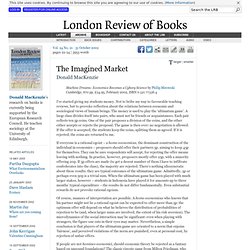
Not to bribe my way to favourable teaching reviews, but to provoke reflection about the relations between economic and sociological views of human beings. The money is used to play the ‘ultimatum game’. A large class divides itself into pairs, who must not be friends or acquaintances. Each pair collects ten 5p coins. If everyone is a rational egoist – a homo economicus, the dominant construction of the individual in economics – proposers should offer their partners 5p, aiming to keep 45p for themselves.
Of course, nuances of interpretation are possible.
How do humans make decisions? Replacing ‘Rational Economic Person’: Networks, Behaviour and Policy in the 21st Century. EmailShare EmailShare This is the first of two guest pieces by Paul Ormerod, the author of “Positive Linking” (Amazon USA; Amazon UK) and several other important books on non-equilibrium economics.
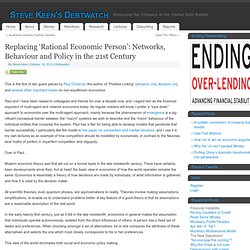
Paul and I have been research colleagues and friends for over a decade now, and I regard him as the foremost exponent of multi-agent and network economics today. As regular readers will know, I prefer a “tops down” approach to economics over the multi-agent approach, mainly because the phenomenon of emergence is a significant conceptual barrier between the “macro” systems we wish to describe and the “micro” behaviour of the individual entities that comprise the system. Paul has a flair for being able to develop models that penetrate that barrier successfully. Over to Paul… Modern economic theory was first set out on a formal basis in the late nineteenth century. Jonah Lehrer on Decision-Making. Behavioural Economics / Finance.
Why are We “Irrational”: The Path from Neoclassical to Behavioral Economics 2.0. A few months ago I discussed the failing of econophysics, and more generally, the economic paradigm that treats people like computers and views economic dynamics like physics.
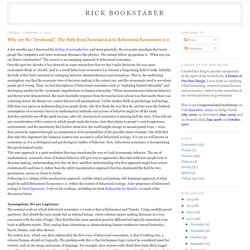
The natural follow up question is, “What can you say that is constructive?” The answer is an emerging approach to behavioral economics. Over the past few decades it has dawned on some researchers that we don't make decisions the way most economists think we should. Amartya Sen's Commitments" Philip Pilkington: Falling for Behaviourism – The Neoclassicals Join a New Cult. By Philip Pilkington, a writer and journalist based in Dublin, Ireland.
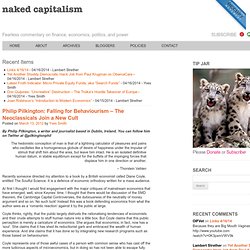
You can follow him on Twitter at @pilkingtonphil. Philip Pilkington: Neoclassical Dogma – : How Economists Rationalise Their Hatred of Free Choice. By Philip Pilkington, a journalist and writer living in Dublin, Ireland What if all the world’s inside of your head Just creations of your own?

Your devils and your gods All the living and the dead And you’re really all alone? You can live in this illusion You can choose to believe You keep looking but you can’t find the woods While you’re hiding in the trees – Nine Inch Nails, Right Where it Belongs Modern economics purports to be scientific. Akerlof and Kranton on identity economics.
George Akerlof and Rachel Kranton have collaborated for over ten years on a simple idea: is it possible to introduce the concept of social identity into the formal mechanics of mainstream economics?

Coleman on the elementary actor. James Coleman's work has had a major influence on an important strand of thinking in the social sciences since the publication of Foundations of Social Theory in 1990.

He was a somewhat iconoclastic sociologist, in that his approach to social theory was grounded in an actor-centered view of the social world. He was a rational-choice theorist in a world of sociologists who usually have a lot of skepticism about rational-choice models of social action. Here is how Coleman describes two basic approaches to sociology in "Social Capital in the Creation of Human Capital" (link; 1988). There are two broad intellectual streams in the description and explanation of social action.
Coleman indicates here that his distinctive approach to sociology attempts to combine both streams; but this isn't quite accurate. David K. Levine is totally wrong on the rational expectations hypothesis. From Lars Pålsson Syll In the wake of the latest financial crisis many people have come to wonder why economists never have been able to predict these manias, panics and crashes that haunt our economies. Complex Economics: Individual and Collective Rationality. Gerd Gigerenzer: On How Decisions are Really Made, Versus How Economists Say They Should Make Decisions, and Why the Folks in the Real World Often Have it Right. This is a bit of a sleeper of a presentation from the recent INET conference.
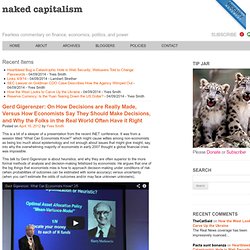
It was from a session titled “What Can Economists Know?” Which might cause willies among non-economists as being too much about epistemology and not enough about issues that might give insight, say, into why the overwhelming majority of economists in early 2007 thought a global financial crisis was impossible. This talk by Gerd Gigerenzer is about heuristics, and why they are often superior to the more formal methods of analysis and decision-making fetishized by economists.